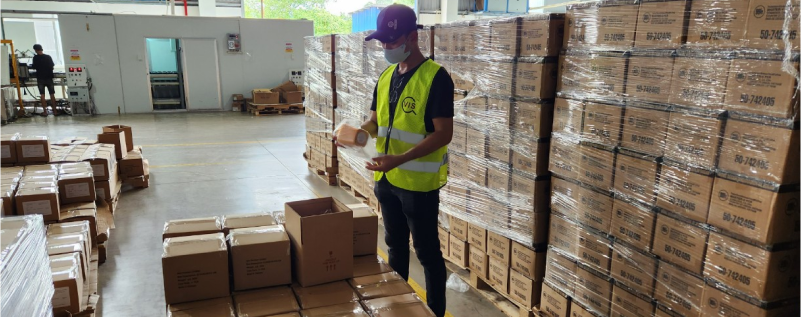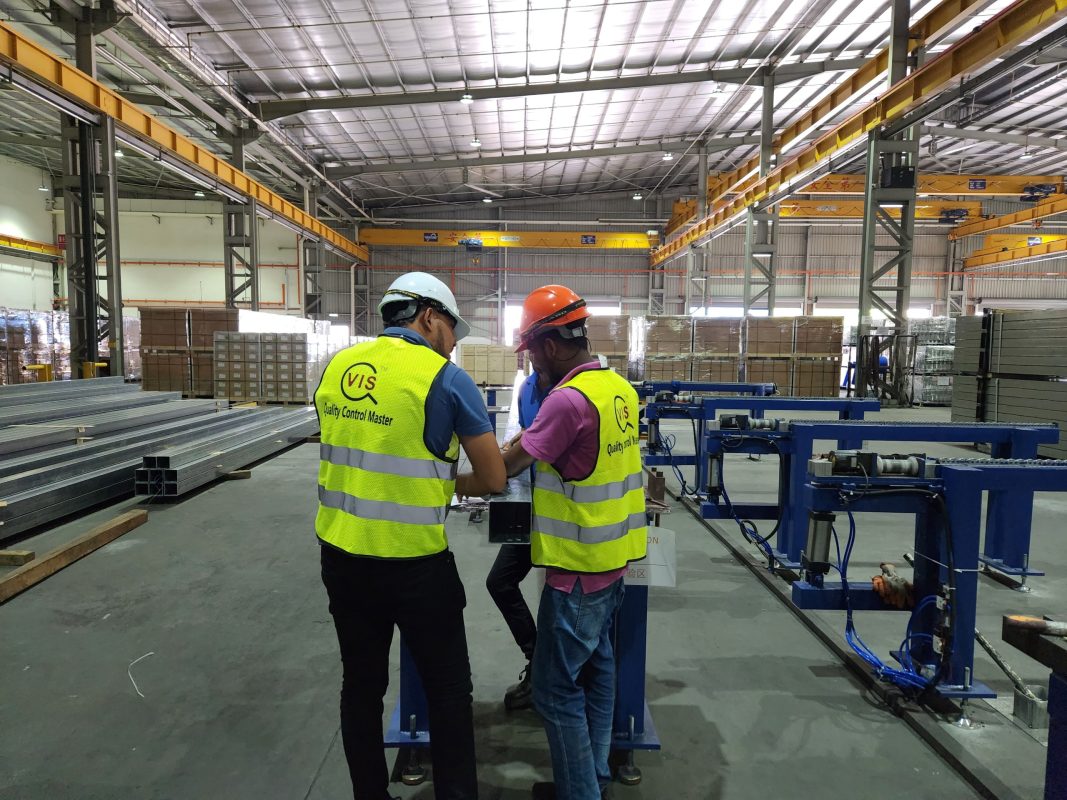Are you an importer looking to ensure the quality of your products? Conducting a QC inspection is crucial. However, there are different ways to conduct an inspection, and choosing the right method can be challenging. In this article, we’ll explore the four most common ways to conduct an inspection and provide you with the pros and cons of each method. By the end of this article, you’ll have a better understanding of which inspection method is best for your business.
Ask Factory Staff to conduct an inspection
Many factories employ specialized QC staff to inspect products at various production stages and as they come off the line. These QC staff members are typically distinct from regular production staff, reporting to different supervisors and sporting unique uniforms and armbands to differentiate themselves from other workers. This separation is intended to prevent bias in product inspection and increase importers’ confidence that their products will be thoroughly inspected before shipping.
While some importers rely on a factory’s own QC staff to inspect goods due to consistent quality from a supplier with whom they have a well-established relationship and clear product expectations defined by a detailed QC checklist, others choose other inspection methods despite being more expensive in the short-term and less convenient to plan for. Most importers find that the unnecessary costs incurred after shipping tend to exceed any short-term savings from letting the supplier inspect independently. These costs may include product returns, rework, or repairs for defective goods, as well as potential damage to the importer’s brand reputation. It is, therefore, crucial for importers to carefully evaluate their risk tolerance when choosing an inspection method.
Sending company’s staff to do inspection
When it comes to ensuring the quality and conformance of your product, it’s understandable that you may feel like no one is a better judge than yourself or someone from your own company. As an importer, you have likely communicated your product requirements to your supplier and have a deep understanding of what is needed for a successful outcome. However, it’s important to consider the pros and cons of personally visiting the factory or sending a representative to conduct the inspection.
While it may be helpful to visit the factory and observe the handling of the product first-hand, traveling to the supplier frequently can come at a significant cost of time, money, and convenience. The expenses associated with traveling to a factory include flight, transportation to the inspection site, accommodation, hiring a translator, and food. These costs can vary depending on your destination and budget, and it’s important to weigh them against the benefits of conducting the inspection yourself.
Another important consideration is your level of QC experience. While you may be well-versed in designing a product, inspecting it may require a different set of skills. Experienced inspectors use certain methods and procedures that allow for a clear “pass” or “fail” result and a report. Without this standard, it cannot be easy to make an informed decision about whether to ship the goods.
Communication challenges can also arise when conducting the inspection yourself. Differences in language can lead to misunderstandings involving product requirements and inspection criteria. Hiring a local inspector who is a native speaker of the local language can help alleviate these concerns.
Ultimately, it’s up to you to decide whether personally visiting the factory or sending someone from your company to conduct the inspection is the best option for your business. While visiting the production area and checking the product can help solve quality problems, it may not be worth the expense to personally visit the factory each time you have an order being produced there. As an importer, it’s important to carefully consider the costs and benefits of each approach and make an informed decision based on your unique situation.
Hire Full-time Inspector
Experienced full-time inspection staff are highly valued in the quality control industry. While they may not specialize in one particular product type, many importers find that hiring full-time staff located near the inspection site to handle product inspection is a successful approach. This is particularly true for larger importers with an annual revenue totaling $10 million or more, who benefit from the high regularity and frequency with which they purchase goods.
The advantages of hiring full-time product inspection staff for handling QC are numerous. Importers enjoy direct management over inspection staff employed by the importer directly. Consistent reporting and inspection methods are ensured since the same staff visits the same factories repeatedly to inspect the same or similar products. Communication between inspection and factory staff is made easy since inspection staff are typically based locally and can speak the local language. Additionally, convenience and cost savings are gained by eliminating the need to send staff from abroad to the inspection site.
In cases of disagreement or uncertainty about product requirements, full-time staff based near the supplier can often provide clarification. It may also be beneficial to train inspection staff exclusively for your company, allowing them to become experts with your particular products and inspection criteria with ease.
Despite the benefits, there are known disadvantages to hiring full-time inspection staff that must be considered. Some importers prefer not to choose this method for inspecting their products due to the high costs of salaries paid to full-time staff and related expenses, legal difficulties associated with opening an office and terminating employees, integrity concerns with sending the same staff repeatedly to the same inspection site, and communication barriers between importers and their inspection staff.
Legal hurdles with operating overseas
One potential challenge with hiring full-time inspection staff overseas is navigating the legal requirements for establishing a local office and hiring or terminating local staff. Unless you intend to engage staff on a contractual basis, you will likely need to establish a legal entity, such as a representative office, which can be a complex and costly process in certain countries.
Another potential risk of hiring full-time inspection staff is corruption, which can take various forms. For instance, factory staff may offer bribes, which may be more prevalent in certain cultures than others. Alternatively, corruption can subtly influence an inspector’s judgment, such as when factory staff offer to arrange transport for the inspector or provide gifts or meals. These gestures can influence the reporting received on the quality and status of an order, which is more likely to occur when the same inspector repeatedly visits the same facilities. Importers who use full-time staff dedicated to inspecting particular locations are particularly vulnerable, although there are strategies to limit this risk.
Managing local inspectors remotely can be challenging, particularly regarding communication. To ensure that inspectors are adequately prepared to deal with products, importers must provide a PO or detailed packing list, product specifications, inspection checklists, known quality issues, approved product samples, factory addresses or inspection locations, and the product sample size or scope of inspection. However, it is not enough to provide this information; importers must also ensure that inspectors fully understand it, as any lost details can result in problems during inspection.
Overall, hiring full-time staff that is locally based and well-trained in their product can be an effective option for importers, particularly those with consistent shipments coming from the same suppliers regularly. However, it is essential to be aware of the potential challenges and risks associated with this approach and take steps to mitigate them.
Hire a third-party inspection company

If you’re an importer looking for a reliable way to manage product quality, using a third-party inspection company could be the answer. By hiring bilingual staff members, language barriers are minimized, and you’ll feel more comfortable knowing that someone understands your cultural expectations. Third-party inspection companies also have measures in place to ensure integrity during inspections, such as documenting all activities and having factory representatives sign affirmations of the inspection report’s accuracy. Plus, hiring inspection help on an as-needed basis with no obligation offers flexibility and cost savings. And if you need related services like factory audits or social compliance oversight, some third-party inspection companies can provide those as well. However, it’s important to be aware of potential conflicts of interest if the same company offering inspection services also offers product sourcing services. In the end, using a third-party inspection company can be a smart choice for managing product quality and helping you make informed decisions.
Conclusion: The 4 common methods for importers to conduct inspection
When you’re choosing an inspection method for your imported products, it’s important to make an informed decision. You’ll want to think about things like cost, product quality, and the experience of the inspector. Ultimately, the decision is up to you, but it’s good to know about the different inspection methods that are available. And if you need professional inspection services, contact the team at VIS Quality Control.



Related Posts